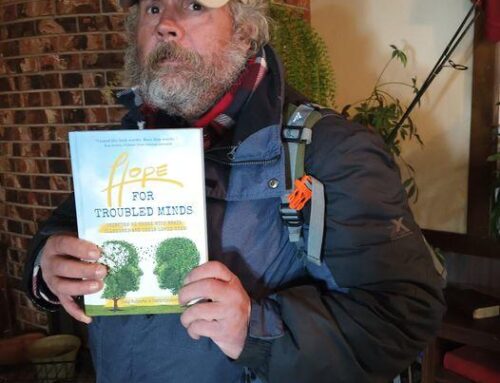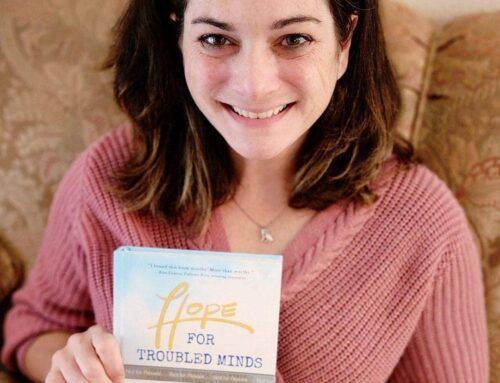Beginning with this post and continuing through 2021, I will be featuring guest posts from persons who have been impacted by mental health challenges, from such things as bouts of anxiety and depression to serious brain disorders (SBD) such as schizophrenia and bipolar disorder. My first featured author is CJ Hanson. Catherine J (CJ) Rippee-Hanson is 63 years old and a lifelong, social activist, writer, and singer – maneuvering through tragedies that have led down many different paths. One of a set of identical twins who now work together to advocate and personally challenge our broken mental healthcare system. Also known as the ‘Twin Tag Team,’ after 33 years of tending to the needs of our brother. He had a horrific accident in 1987, resulting in a TBI and loss of his eyes. Three years later he began showing symptoms of Schizophrenia w/Psychosis with chronic and severe Anosognosia. He has been homeless for 13 years while we have sought to find supervised housing and care. Author of the personal blog… “Am I Not My Brother’s Keeper?” and Administrator of the Facebook group, “Mark of Vacaville.”
Mental health and mental illness are not the same things. Most people believe that they have the same meaning, but that is not true. Mental health focuses on mental well-being just as physical health focuses on physical well-being. Everyone wants to maintain their physical health and a healthy mentality. The term, mental illness focuses on the various issues that individuals encounter in relation to the mind and more precisely, illness of the brain. There are many mental disorders including the more serious mental illnesses (SMI), now increasingly and properly referred to as serious brain disorders (SBD).
Mental health often refers to happiness, and the resilience connected with life and reality, including the ability to cope. with mental illness. Having a good outlook towards life can aid in coping, especially if an individual indeed has a serious mental illness. But, this can only be gained through an awareness of mental health. About 50% of people with serious mental illness/brain disorders not only do not have an awareness of what good mental health is…they also lack awareness of having a serious brain disorder.
Mental illness may include anxiety, depression, disorganized thinking, and even auditory hallucinations and psychosis. While mental illness is a negative concept, it speaks about the problems relating to human thinking, the functioning of the mind, drug abuse or self-medication, and perceiving and interacting with reality. A person might have been diagnosed with mental illness but can still cope and have good mental health with the support of their family members, friends, and of course, good treatment, whether medication or therapy. They may even thrive if they have the support in which they live or their community. It takes a lot of effort on the part of the person diagnosed with mental illness to see the brighter side of life and be optimistic and so their support system becomes paramount to their mental stability and ability to cope – their mental health.
The holidays, especially, are full of obstacles. In my own family, it is basically my Mom, my twin sister, and me, who worry about and try to take care of our brother’s needs for the last 33 years. He has many disabilities from an accident but also has schizophrenia with anosognosia. There are some extended family members (I have an exceptionally large family) that do care but they live out of state. Then there is the other segment of the family that may seem sympathetic to what our struggle is – but not enough to be involved or even around our brother… mostly the younger generation. They do not even understand why we will not just give up on him.
He is embarrassing…or scary. He must deserve it, because of something he did… He just needs “tough love”… not real love and support. I know many, many family members who have loved ones that they love and even advocate for – but are not supported by the rest of their family. There is a disconnect that happens when that person who they used to love falls ill. What many of those estranged family members do not realize or think about is that if they came down with a horrible illness – that we would be just as devoted to them. But they do not understand what it means to have true devotion and support… until the unimaginable happens to them – it just seems like too much of a burden.
Without support, compassion, and empathy from the world in which they live…those with mental illnesses may falter and struggle and those with serious mental illness/brain disorders will fall through the cracks of our current mental healthcare system. So many mental illness advocates are also family members and know that it often seems like no matter how much we try to do – we are always just left dealing with crisis’ and putting out fires, day after day, while those in power or with some authority, not only turn their backs to struggling families and expect them to “fix” what is seen all too often as “our fault.”
The answers we find in our laws and system are lacking. The solutions we seek are elusive. We know all too well that no promise we get is a fully complete one… or committed one. We cannot guarantee that the professionals have enough compassion or that the treatment available will work in all cases. And even with all the “answers” that so many think there is… it almost always comes back on family members, as we are expected to be grateful for what little is done to truly help our loved ones.
It can be so hard on the mentally ill who do not understand why some family members do not want to be around them. For them and their families, being on the receiving end of blame by people who have no clue is an insult to injury. We are supposed to find a way to manage our family member’s illness and often more importantly, in a way that does not require the support of the whole family. It takes so much more than most people can comprehend. And it can be very lonely indeed for those individuals suffering and for the families that are struggling.
If I had a wish for the holiday season this year, it would be that those who have no interest in understanding would suddenly awaken, and be able to give something of themselves to those who through no fault of their own suffer from mental illness, especially serious mental illness, or serious brain disorders.
Yes, mental health and mental illness may have two very distinct and different meanings – but the presence of love, compassion, understanding, and empathy from as many people as possible certainly goes a long way in the “mental health” of the seriously mentally ill.
Discover more from Delight in Disorder
Subscribe to get the latest posts sent to your email.







